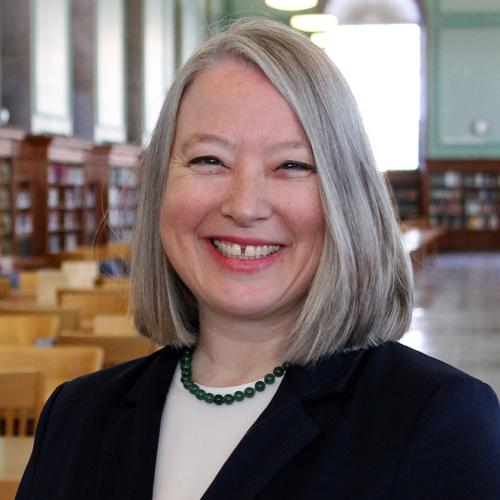Watch the seminar: Academic Library Response
to COVID-19
When universities began closing their campuses and going to online classes in response to the COVID-19 pandemic, academic librarians were faced with questions about how those decisions would affect libraries and whether to close their doors or restrict access.
"People are looking to best practices in the field, but also to what actions their colleagues and peers are taking and how they are thinking about this," said Affiliate Professor Lisa Janicke Hinchliffe, professor and coordinator for information literacy services and instruction in the University Library.
But there was no one collecting information on what libraries were doing. Hinchliffe talked with frequent collaborator Christine Wolff-Eisenberg, the manager for surveys and research at Ithaka S+R, a research and strategy group on issues related to libraries, museums and publishing. In one day, they developed a prototype survey for academic librarians; asked the library community on Twitter to take the survey and provide feedback; fine-tuned their questions; and put the survey online.
The project provides a national look at how academic libraries are responding to the COVID-19 pandemic. More than 800 academic libraries–of the more than 3,000 such institutions in the country–have provided information through the Academic Library Response to COVID19 survey. The online portal for the project provides real-time dissemination of the survey results, and Hinchliffe and Wolff-Eisenberg have written three analyses of the data since the project began March 11.
"To our knowledge, this is the most comprehensive dataset of not only the status of U.S. academic libraries, but also of which institutions have moved their courses online and which have vacated their residential facilities," Hinchliffe and Wolff-Eisenberg wrote in a blog post.
The survey includes questions about the status at each institution of classes, student residential facilities, library building hours, general public access to libraries, cleaning and safety measures, social-distancing measures, reference services, access to print materials and policies on employees working remotely.
Librarians are able to retake the survey to update the status of their libraries, and the data show patterns of how policies have changed over time and in relation to the status of classes on campus.
The goal of the project is to serve the needs of academic librarians making decisions and to provide information that will help university leaders understand the bigger picture of what is happening among U.S. academic libraries, Hinchliffe said.
"Library leaders can use this to say, 'Here's what's happening in the field more generally.' They can draw upon the data to have a context for recommendations they are making," she said.
Librarians also have found useful information in the survey questions and responses. For example, in the section on cleaning and safety, the survey asks about such things as daily cleaning of keyboards and other equipment, providing hand sanitizer to patrons and quarantining returned materials for a time before they are handled by staff. In their responses, librarians have mentioned actions they are taking that are not in the survey questions.
"A number of people said to us, 'We weren't doing those things but we are now,'" Hinchliffe said.
The researchers plan to keep the survey open and continue to provide data and analysis as long as responses keep coming in and people find it useful. They also will analyze the data for future research in areas such as decision-making in crises and to help develop emergency procedures.
"There is an immense amount of analysis that can be done on this dataset to look at the lessons that can be learned," Hinchliffe said.
For example, her examination of the literature on crisis responses by libraries found procedures for continuing service by physically relocating the library service point–useful in the event of a fire or flooding, but "that isn't a strategy when a campus has shut down and there’s a shelter-in-place order."
Libraries are well-positioned to respond to such a crisis, she said.
"Libraries have had this digital infrastructure in development over the last two decades. They have been running simultaneously a digital and an in-person library. We need to pivot to the digital library as the exclusive mode," Hinchliffe said. "I feel quite proud of the academic library community and how it has protected the safety of staff and users by closing physical locations, while still providing a high level of service and adding some services when faculty members and students moved online."
The portal for the Academic Library Response to COVID19 survey and results can be found online.
